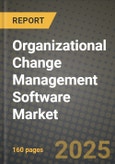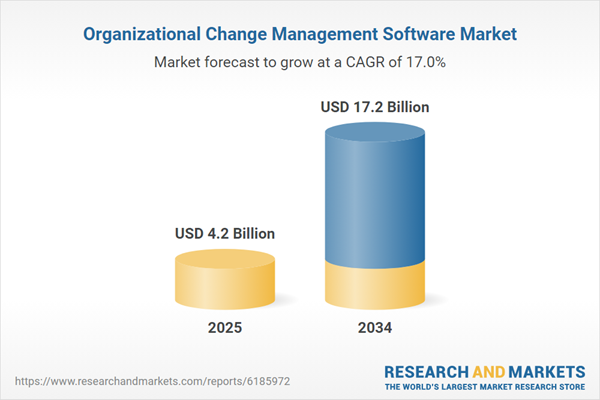The organizational change management software market has been experiencing rapid growth, driven by increasing digital transformation, evolving workplace structures, and the need for businesses to efficiently manage change. Organizations across industries are adopting change management software to streamline processes, enhance employee engagement, and ensure seamless transitions during business transformations. These software solutions provide real-time analytics, workflow automation, employee feedback mechanisms, and training tools to support companies in executing change initiatives with minimal disruption. The rise of cloud-based solutions, AI-driven automation, and remote work models has further accelerated the adoption of change management software, allowing businesses to manage organizational shifts in a more structured and data-driven manner. Large enterprises, as well as small and medium-sized businesses (SMBs), are investing in these platforms to improve agility, workforce adaptability, and long-term business resilience. While challenges such as user resistance, integration complexities, and security concerns persist, the continuous evolution of AI-powered change management platforms is enabling organizations to create data-backed strategies for successful transformation.
The organizational change management software market saw notable advancements, with AI-powered analytics, machine learning algorithms, and cloud-based deployment models transforming the way organizations manage change. Companies increasingly leveraged AI-driven sentiment analysis to measure employee engagement and predict change adoption challenges, allowing for proactive strategy adjustments. The demand for mobile-friendly change management platforms surged, enabling real-time communication and collaboration among employees, regardless of their geographical location. Integration with enterprise resource planning (ERP) and human capital management (HCM) systems became a priority, ensuring seamless alignment between business processes and change management strategies. Additionally, the growing importance of cybersecurity and data protection led vendors to enhance security features, ensuring compliance with global regulatory standards such as GDPR and ISO 27001. Despite these advancements, budget constraints and economic uncertainties caused some companies to delay investments in change management software. However, organizations that prioritized digital transformation initiatives continued to drive market growth, recognizing the critical role of structured change management software in enhancing operational efficiency and employee engagement.
The organizational change management software market is expected to witness further innovations, driven by AI-powered automation, personalized learning experiences, and enhanced integration capabilities. AI-driven predictive modeling will become a key feature, helping organizations anticipate change resistance and tailor interventions accordingly. The rise of digital twins in organizational change management will allow businesses to simulate change scenarios, assess risks, and fine-tune strategies before implementation. The adoption of blockchain technology in change management software will enhance data security, ensuring the integrity of employee feedback and process analytics. Emerging markets in Asia-Pacific, Latin America, and the Middle East will contribute to market expansion as businesses in these regions accelerate digital transformation initiatives. Additionally, sustainability-driven organizational changes will fuel demand for change management software that supports ESG (Environmental, Social, and Governance) compliance and corporate responsibility initiatives. However, the challenge of integrating legacy IT systems with advanced change management software will remain a concern for many organizations. Despite these challenges, the market is expected to continue growing, fueled by business resilience strategies, AI-driven decision-making, and an increasingly agile workforce.
Key Insights: Organizational Change Management Software Market
- AI-Driven Predictive Change Management Analytics: Organizations are leveraging AI-powered predictive analytics to assess employee sentiment, anticipate change resistance, and create data-driven strategies for seamless transformation.
- Integration of Change Management Software with ERP and HCM Systems: Businesses are increasingly integrating change management software with enterprise resource planning (ERP) and human capital management (HCM) platforms to ensure cohesive workflows and streamlined organizational transitions.
- Growing Demand for Mobile-Friendly and Remote Change Management Solutions: The rise of hybrid and remote work models has fueled demand for mobile-responsive change management software that enables real-time collaboration and communication.
- Expansion of Blockchain for Data Security in Change Management: Blockchain technology is being integrated into change management platforms to enhance data security, ensuring the integrity of change tracking, employee feedback, and organizational performance analytics.
- Adoption of Digital Twins in Organizational Change Planning: Companies are utilizing digital twins to simulate organizational change scenarios, optimize transition strategies, and reduce risks before full-scale implementation.
- Rapid Acceleration of Digital Transformation Initiatives: Organizations undergoing large-scale digital transformations are adopting change management software to streamline processes, improve adaptability, and minimize operational disruptions.
- Increasing Complexity of Workforce Dynamics: With the rise of hybrid work, gig economy models, and global workforce expansions, businesses are investing in change management software to ensure smooth organizational transitions and workforce engagement.
- Stronger Regulatory Compliance and Data Protection Requirements: Governments and regulatory bodies are enforcing stricter compliance measures, driving demand for change management software that ensures data security, privacy, and compliance with industry standards.
- Growing Investment in Employee Experience and Change Resilience: Organizations are prioritizing change management solutions that enhance employee experience, promote engagement, and reduce resistance to transformation initiatives.
- Integration Challenges with Legacy IT Systems: Many organizations struggle to integrate modern change management software with outdated legacy systems, leading to technical complexities, workflow disruptions, and increased implementation costs.
Key Trends, market drivers, and challenges shaping its future. Would you like insights into specific software solutions, regional market dynamics, or competitive analysis?Organizational Change Management Software Market Segmentation
By Product
- Cloud-based
- On-premises
By Application
- Small and Medium Enterprises (SMEs)
- Large Enterprises
By End User
- Banking
- Financial Services
- and Insurance (BFSI)
- Information Technology (IT) and Telecom
- Government and Public Administration
- Healthcare
- Education
- Retail
- Energy and Utilities
- Manufacturing
- Construction and Real Estate
- Other End Users
Key Companies Analysed
- Microsoft Corporation
- Accenture Plc
- International Business Machines Corporation
- Deloitte Touche Tohmatsu Limited
- Oracle Corporation
- SAP SE
- Salesforce Inc.
- ServiceNow Inc.
- Bain & Company Inc
- Change Compass Inc.
- OpenText Corporation
- ManageEngine
- Freshworks Inc.
- Praxis
- ServiceAide Inc.
- Nakisa Inc.
- Whatfix Inc.
- SysAid Technologies Ltd.
- Cognician Inc.
- SmartSolve LLC
- FluentPro Software Corp
- Orgmapper
- Canfigure
- Gensuite
- jTask Inc.
Organizational Change Management Software Market Analytics
The report employs rigorous tools, including Porter’s Five Forces, value chain mapping, and scenario-based modeling, to assess supply-demand dynamics. Cross-sector influences from parent, derived, and substitute markets are evaluated to identify risks and opportunities. Trade and pricing analytics provide an up-to-date view of international flows, including leading exporters, importers, and regional price trends.Macroeconomic indicators, policy frameworks such as carbon pricing and energy security strategies, and evolving consumer behavior are considered in forecasting scenarios. Recent deal flows, partnerships, and technology innovations are incorporated to assess their impact on future market performance.
Organizational Change Management Software Market Competitive Intelligence
The competitive landscape is mapped through proprietary frameworks, profiling leading companies with details on business models, product portfolios, financial performance, and strategic initiatives. Key developments such as mergers & acquisitions, technology collaborations, investment inflows, and regional expansions are analyzed for their competitive impact. The report also identifies emerging players and innovative startups contributing to market disruption.Regional insights highlight the most promising investment destinations, regulatory landscapes, and evolving partnerships across energy and industrial corridors.
Countries Covered
- North America - Organizational Change Management Software market data and outlook to 2034
- United States
- Canada
- Mexico
- Europe - Organizational Change Management Software market data and outlook to 2034
- Germany
- United Kingdom
- France
- Italy
- Spain
- BeNeLux
- Russia
- Sweden
- Asia-Pacific - Organizational Change Management Software market data and outlook to 2034
- China
- Japan
- India
- South Korea
- Australia
- Indonesia
- Malaysia
- Vietnam
- Middle East and Africa - Organizational Change Management Software market data and outlook to 2034
- Saudi Arabia
- South Africa
- Iran
- UAE
- Egypt
- South and Central America - Organizational Change Management Software market data and outlook to 2034
- Brazil
- Argentina
- Chile
- Peru
Research Methodology
This study combines primary inputs from industry experts across the Organizational Change Management Software value chain with secondary data from associations, government publications, trade databases, and company disclosures. Proprietary modeling techniques, including data triangulation, statistical correlation, and scenario planning, are applied to deliver reliable market sizing and forecasting.Key Questions Addressed
- What is the current and forecast market size of the Organizational Change Management Software industry at global, regional, and country levels?
- Which types, applications, and technologies present the highest growth potential?
- How are supply chains adapting to geopolitical and economic shocks?
- What role do policy frameworks, trade flows, and sustainability targets play in shaping demand?
- Who are the leading players, and how are their strategies evolving in the face of global uncertainty?
- Which regional “hotspots” and customer segments will outpace the market, and what go-to-market and partnership models best support entry and expansion?
- Where are the most investable opportunities - across technology roadmaps, sustainability-linked innovation, and M&A - and what is the best segment to invest over the next 3-5 years?
Your Key Takeaways from the Organizational Change Management Software Market Report
- Global Organizational Change Management Software market size and growth projections (CAGR), 2024-2034
- Impact of Russia-Ukraine, Israel-Palestine, and Hamas conflicts on Organizational Change Management Software trade, costs, and supply chains
- Organizational Change Management Software market size, share, and outlook across 5 regions and 27 countries, 2023-2034
- Organizational Change Management Software market size, CAGR, and market share of key products, applications, and end-user verticals, 2023-2034
- Short- and long-term Organizational Change Management Software market trends, drivers, restraints, and opportunities
- Porter’s Five Forces analysis, technological developments, and Organizational Change Management Software supply chain analysis
- Organizational Change Management Software trade analysis, Organizational Change Management Software market price analysis, and Organizational Change Management Software supply/demand dynamics
- Profiles of 5 leading companies - overview, key strategies, financials, and products
- Latest Organizational Change Management Software market news and developments
Additional Support
With the purchase of this report, you will receive:- An updated PDF report and an MS Excel data workbook containing all market tables and figures for easy analysis.
- 7-day post-sale analyst support for clarifications and in-scope supplementary data, ensuring the deliverable aligns precisely with your requirements.
- Complimentary report update to incorporate the latest available data and the impact of recent market developments.
This product will be delivered within 1-3 business days.
Table of Contents
Companies Mentioned
- Microsoft Corporation
- Accenture PLC
- International Business Machines Corporation
- Deloitte Touche Tohmatsu Limited
- Oracle Corporation
- SAP SE
- Salesforce Inc.
- ServiceNow Inc.
- Bain & Company Inc.
- Change Compass Inc.
- OpenText Corporation
- ManageEngine
- Freshworks Inc.
- Praxis
- ServiceAide Inc.
- Nakisa Inc.
- Whatfix Inc.
- SysAid Technologies Ltd.
- Cognician Inc.
- SmartSolve LLC
- FluentPro Software Corp
- Orgmapper
- Canfigure
- Gensuite
- jTask Inc.
Table Information
| Report Attribute | Details |
|---|---|
| No. of Pages | 160 |
| Published | October 2025 |
| Forecast Period | 2025 - 2034 |
| Estimated Market Value ( USD | $ 4.2 Billion |
| Forecasted Market Value ( USD | $ 17.2 Billion |
| Compound Annual Growth Rate | 16.9% |
| Regions Covered | Global |
| No. of Companies Mentioned | 25 |









